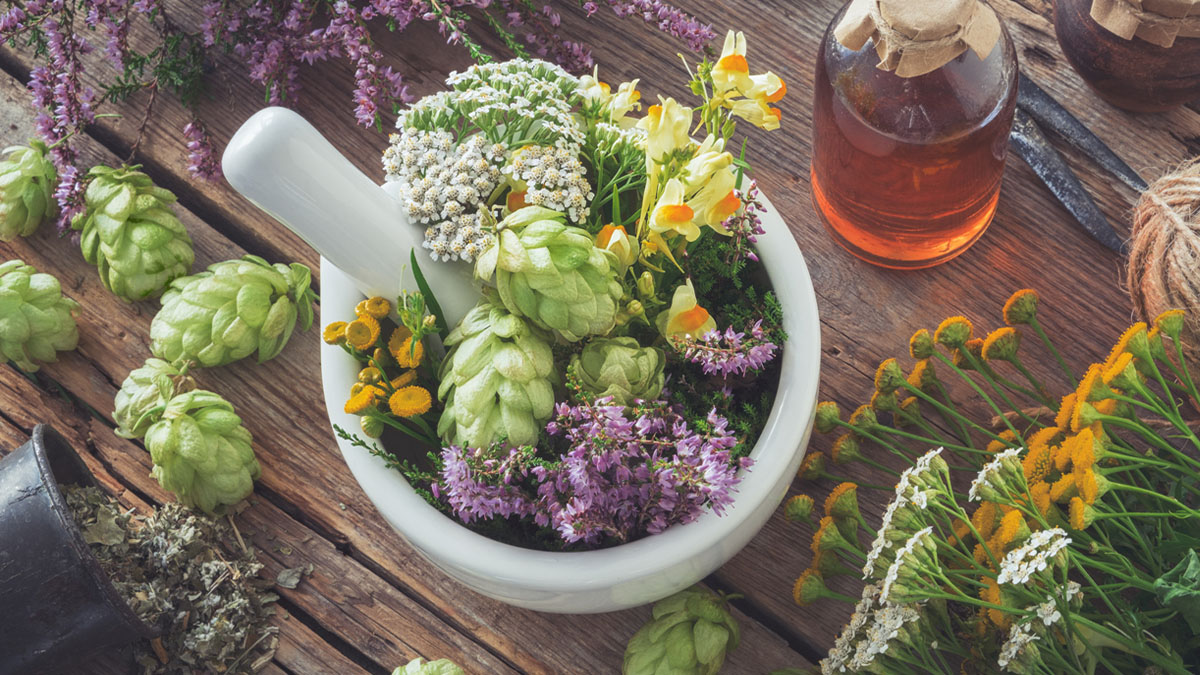Dr Des Corrigan asks how many of the numerous products in pop-up advertisements deserve the title of ‘herbs’
I presume I am not the only one plagued by pop-up ads on phones and laptops. In my case, the algorithms monitoring my usage are surely responsible for my receiving ads for a CBD-containing product. Another one that recently appeared alongside my emails, titled “5 herbs for arthritic knees”, was guaranteed to attract my attention, as I wanted to see which herbs were being promoted. To my bemusement, the key ingredients were listed as collagen, Boswellia serrata, turmeric, bioperine and MSM. I therefore set out to find out more about these five ‘herbs’ and their value in arthritis of the knee.
For a start, only three of these can be considered to be ‘herbal’, namely the Boswellia, the turmeric and at a stretch, the bioperine. Describing the latter, a patented extract of black pepper containing at least 95 per cent of the alkaloid piperine, as a herb, is stretching the description ‘herbal’ to its limits. Collagen, as far as I know, is an animal protein and MSM, or methylsulfonylmethane, is predominantly synthetic in origin, though tiny amounts can be detected in some plants. If the number of herbs is inaccurate, what then of the ‘claim’ that this product has a positive impact on arthritic knees?
The piperine is not included for any inherent pharmacological effect it might have, but because it enhances the bioavailability of other substances by inhibiting both P-glycoprotein and UDP-glucose dehydrogenases in both liver and intestine, thus inhibiting xenobiotic metabolism. Presumably, it is included to improve plasma levels of curcuminoids from turmeric, which have notoriously poor bioavailability. I have written a number of times about this supposed ‘super’ herb/spice, covering areas such as its use in cancer therapy, as a memory enhancer and in January of last year, about the evidence for its effects on arthritis.
In that article, I noted that two separate systematic reviews in 2016 and 2018 had pointed to the effectiveness of turmeric and its main component, curcumin, in arthritis-related disease, even though the EMA has not accepted the evidence so far. I finished up by observing: “It seems as if the EMA has missed the boat on this one and that ginger and curcuma alone or in combination have something to offer your patients with osteoarthritis, and that you could consider recommending them with a degree of confidence”.
I have no reason to change that view, given the evidence published since then, including another systematic review and meta-analysis of turmeric/curcuminoids alone. Another paper in the journal BMC Complementary and Alternative Medicine published in 2018 involved a trial of a combination product containing curcuminoids and boswellic acid. Boswellic acid is a triterpene structurally similar to steroids isolated from various Boswellia species that are better known as ‘frankincense’. In this three-arm, parallel group, randomised, double-blinded, placebo-controlled trial, 201 patients with osteoarthritis were given either the combination of curcuminoids on their own, or a placebo three times daily for 12 weeks. A significant effect of the combination product was seen in both physical function tests and in the WOMAC (Western Ontario and McMasters Universities) joint pain index, whereas the curcuminoids on their own were only superior to placebo in physical performance tests.
Boswellic acids were also combined with MSM in a 2016 study reported in the International Journal of Immunopathology and Pharmacology. This was a randomised but unblinded trial involving 120 participants with arthritis of the knee who were given either the mix of MSM/Boswellic acids or glucosamine sulphate daily for two months.
Outcome measures included a visual analogue pain scale (VAS), the Lequesne Index for joint function and the use of anti-inflammatory medication (NSAIDs or COX-2 inhibitors). The results for both groups were positive, with a tendency towards better values in the group, given the combination. As usual, the authors noted that their results suggested potential effects of the combination but that more research was necessary.
MSM is found in fruits, vegetables and grains but the amounts are so small (parts per million) that dietary intake could not possibly be sufficient for pharmacological activity. Most MSM is synthesised by oxidation of its parent compound dimethyl sulphoxide (DMSO) and the two molecules share a common history of use as solvents. Research into its possible therapeutic uses also arose from its relationship to DMSO. A range of patents in the 1970s described potential uses for MSM as a stress and pain reliever, but the scientific evidence was scant. Gradually, more evidence emerged of its effects in arthritis and other inflammatory conditions and in 2007, one commercial product was granted Generally Recognised As Safe (GRAS) status by the FDA. A range of anti-inflammatory effects both in vitro and in vivo has been demonstrated over the years.
A typical example is a paper in the Journal of Bone and Mineral Metabolism in 2013 that looked at the effects of MSM on cartilage formation in a mouse model of human osteoarthritis. Intake of MSM for 13 weeks decreased degeneration of the cartilage in the knee joints of the mice.
A range of patents in the 1970s described potential uses for MSM as a stress and pain reliever but the scientific evidence was scant
There is also an abundance of clinical data to back-up the preclinical results. In 2006, a pilot clinical trial reported in Osteoarthritis and Cartilage involved 50 patients with pain due to osteoarthritis of the knee, who were enrolled in an RCT where they were given either 3g of MSM or a placebo twice a day for 12 weeks. Compared to placebo, the MSM produced significant decreases in WOMAC pain and physical function impairment. In the SF-36 quality of life assessment, MSM produced an improvement in performance of daily living tasks compared to placebo, but the authors noted that the clinical significance of their findings were uncertain. The same journal included a systematic review of MSM (and DMSO) in 2008. This included just 52 patients in the treatment groups. Data from the trials, described as “rigorous” by the reviewers, provided positive but not definitive evidence that MSM is superior to placebo in treating mild-to-moderate osteoarthritis of the knee but inevitably, more research was needed.
In 2011, a paper in BMC Complementary and Alternative Medicine described an RCT involving 49 patients with osteoarthritis of the knee. One group received MSM three times a day for 12 weeks, while the second took a placebo. While there were significant differences between the treatment and placebo groups in relation to WOMAC physical function and total score, they did not differ in WOMAC pain or stiffness scores. A VAS pain score did show a significant difference in favour of MSM. The authors concluded that the improvements in pain and physical function were small and “it is yet to be determined if they are of clinical significance”.
While the results in relation to MSM are not overwhelming, the evidence for turmeric and Boswellia is strong enough to overcome my scepticism arising from the inaccurate portrayal of MSM and collagen as ‘herbs’ in the online ad.








